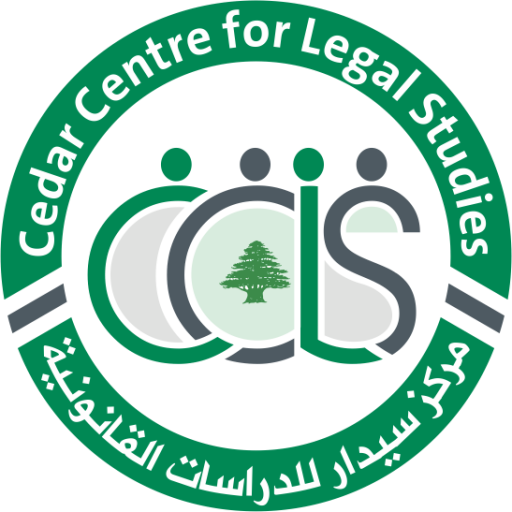Cedar Centre For Legal Studies
Activity
Organizing a round table on the occasion of the International Day in Support of Victims of Torture
27/06/2023

27/06/2023
The round table was attended, in addition to the main speakers, by: former head of the Bar Association, Mohamed Al-Murad, Mr. Zein Ayoub, representative of the United Nations High Commissioner for Human Rights in the Middle East and North Africa, the former head of the Sanctions Reduction Committee, Judge Hamza Sharaf Al-Din, and the government commissioner to the United Nations, Mr. Ahmed Al Taleb, Mr. Edmond Medlej, representative of the National Commission for Human Rights, and representatives of the British and Norwegian embassies, local and international human rights organizations, and lawyers.
Speech of Me Mohammad Sablouh
The discussion session began with a speech by the general director of the Cedar Centre for Legal Studies, lawyer Mohamad Sablouh, who in turn presented samples of violations against detainees in detention centers and prisons, pointing out the spread of the culture of “violence in extracting investigations,” and non-implementing of Law 65/2017. In addition to limited of applying of the amended Article 47 of the Code of Criminal Procedure in preliminary investigations, especially by security services that intentionally or ignorantly refrain from providing detainees with information related to their rights.
Me. Sablouh then reviewed a number of cases of torture for which he was legally appointed, including the case of Bashar AbedSaoud, a Syrian asylum seeker. He later pointed out that the security authorities had violated article 3 of the UN convention against torture and the Lebanese law related to combating torture in forced deportation campaigns of refugees since the end of last year. Article Three of the United Nations Convention stipulates that “no State Party shall expel, return (“refouler”) or extradite a person to another State where there are substantial grounds for believing that he would be in danger of being subjected to torture.”
A video was then shown, including testimony from the mother of torture victim Walid Diab, who was subjected to severe torture in Lebanese detention centers when he was not yet thirteen years old, and was killed in early 2021 as a result of an individual problem. The grief-stricken mother linked his murder to the repercussions of torture and imprisonment. Lawyer Sablouh commented in the video on the brutal crime of torture that befell Diab, from electric shocks, pulling out nails, and severe beatings, which left negative psychological effects on the victim, transforming him from an innocent child into a tortured and psychologically disturbed prisoner, a social outcast instead of undergoing the necessary rehabilitation.
Speech of Me. Ghida Franjieh
Then lawyer and researcher Ghida Franjieh, who currently holds the position of head of the Strategic Litigation Department at the Legal Agenda, took the stage. In her speech, she addressed two topics: the first was the issuance of the indictment against the members who tortured the detained Bashar AbedSaoud, noting that it was the first indictment against officials since the issuance of the anti-torture law, and that it was even the first official account issued about a brutal torture crime like the one to which AbedSaoud was subjected. After dozens of cases in which the security and judiciary disavowed, at times denying the occurrence of torture and at other times considering it an isolated incident, in addition to strengthening the principle of exceptional judiciary in torture-related investigations, and promoting those involved in torture crimes. The second topic was in brief about observations on the deportation campaigns against refugees, which took on a dangerous nature in that they were collective, coercive, and based on a decision of the Supreme Defense Council, which basically did not permit such continuous raids on asylum seekers’ homes and then deporting them without an actual evaluation.
Speech of Ramzi Kaiss
Then the representative of Human Rights Watch, Ramzi Kaiss, spoke, who highlighted three points: the organization’s work to effectively implement the combat against torture, the organization’s fears of forced deportations, and the organization’s follow-up of the case of the detained Bashar AbedSaoud. He called on the authorities to begin work on a transparent and impartial investigation into all torture cases.
Speech of Dr. Issam Sibat
Then, Dr. Issam Sibat, a lawyer at the Lebanese Center for Human Rights, presented an academic presentation of the disparity between law and application and the ambiguous loopholes in the Lebanese law to punish torture, comparing it to French law. The most important point is that Lebanese law stipulates that the status of limitations for the crime of torture would be from 3 to 10 years, and the limitations begins when the victim is released from prison, detention, or temporary detention, in contravention of international standards that stipulate that there should be no status of limitations for the crime of torture. In addition, the articles of the law do not adequately reflect the serious nature of the crime of torture.
Interventions from participants
Then there were important interventions in which the former head of the Bar Association, Mr. Mohammad Al-Murad, the representative of the National Commission for Human Rights, Mr. Edmond Medlej, Judge Hamza Sharaf Al-Din, Mr. Ahmed Talib, the government commissioner to the United Nations, Dr. Abdul Rahman Mubasher, and the lawyer Tawfiq Al-Dika, father of a former torture victim Hassan Al-Dika; who died due to the torture he was subjected to.
Joint statement to the Lebanese authorities
At the end of the session, a joint statement was distributed, read by Mr Saadeddine Shatila and was signed by the following NGOs: the Lebanese Center for Human Rights, the Legal Agenda, Proud Lebanon, the Helping Hands Association, AJEM, the Khiam Center for the Rehabilitation of Victims of Torture, the Cedar Centre for Legal Studies, MENA Rights Group, and Human Rights Watch.
